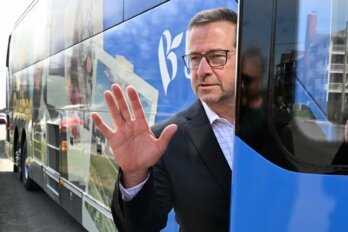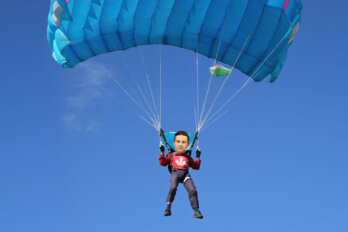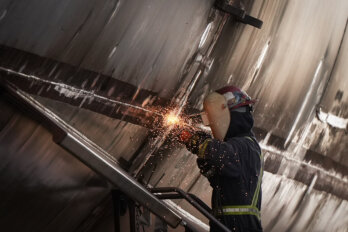I entered the sliding doors of the Porter lounge at the Ottawa airport to a long and narrow room. At the far end, near the cooler of Evian water and plastic-wrapped croissants, a woman was perched cross-legged on a steep chair, her hair in a high ponytail. She gave the impression of reading three things at once—phone, book, papers—and bouncing precariously as she did. Even though her back was to me, and I hadn’t seen her in almost fifteen years, I knew there was only one person it could be.
“Chrystia Freeland,” I said, and she launched in. Did I think Trudeau would win the federal election? It was 2014. Freeland had left a leaps-and-bounds career in journalism (Financial Times; The Economist; the Washington Post; Reuters; the Globe and Mail, where we worked together for two years) to join his Liberal Party, then the underdog in third place, and yes, I told her, I did think he’d win. She wanted to know why. This was classic Freeland, working while schmoozing. I understood at once she wasn’t making polite conversation. She was on the job, looking for any sideways idea that might bolster the campaign. Her capacious ability to root out useful material—chin nodding, her eyes sharp on me, don’t slip up—is the reporter’s skill. Whether she can marshal that material to win the upcoming Liberal leadership race—that would be the politician’s skill—we’ll find out when 400,000 party members vote on March 9.
Freeland, by any measure, is the most qualified for the job. She has ten years of experience running five campaigns. She has been trade minister, foreign minister, deputy prime minister, and finance minister. During US president Donald Trump’s first term, she drove the 2019 North American Free Trade Agreement with the US and Mexico. She has learned not to underestimate the American president as a strategist and has forged connections with people close to Trump. At home, she’s crossed party divides to ally with premiers and mayors, business and union leaders. She played a large part in reducing the cost of daycare nationally and, internationally, drove the fights against Russian president Vladimir Putin’s invasion of Ukraine, the persecution of Muslims in Myanmar, and human rights abuses in Saudi Arabia and Venezuela. Bob Rae, Canada’s ambassador to the United Nations, is quoted in Catherine Tsalikis’s recent Freeland biography saying Freeland believes strongly that the value proposition for Canada in the current world order is being a country that “speaks the truth to every issue that it sees.” Throw in that she speaks five languages, grew up on an Alberta farm, and can drive a combine and it adds up to someone who can walk into the role of Liberal leader as this country heads toward the double whammy of a federal election and a trade war.
Except that since she joined the Liberal leadership race in January, I have been having or hearing the same conversation wherever I go. It began a few weeks ago with friends and family, men and women, and has since gained momentum in Canadian media: Chrystia Freeland is not the right person for the job. She can’t beat Poilievre, the argument goes. At times, it seems like nobody can as Canada joins the tidal wave of global populism. But where’s the logic in not putting the proven fighter into the ring? If we toss out the best résumé, then what is it that we do want?
I met Freeland in 1999, when she was the newly appointed deputy editor (or number two, as the role is called in the news business) of the Globe and Mail, and I was the managing editor of features. We worked together until she left in late 2001 for London’s Financial Times, where she’d become the deputy editor (number two again; this will be important) of one of Europe’s most influential papers.
Running a large newsroom means making hundreds of decisions a day about the moment you’re in and looking ahead to the next moment coming up; it is at once a quickly reactive and deeply thoughtful job. Not for the fearful. Especially when the magnitude of the news has just changed the world.
On the morning of 9/11, the editor of the Globe was in London and Freeland, thirty-three at the time, took over the paper. She quickly aligned the often-fractious newsroom, sending fleets of reporters from every part of the floor to New York, and then pushed for acres of extra print, finding the money seemingly out of the ether—we were fighting over pencils at that point, so slender was the news budget. And she set an indefatigable pace she expected the rest of us to follow. (I remember Freeland’s stinting praise to me when she left for the FT shortly after 9/11: “You’re good. Work harder.” At another airport crossing, by now it might have been 2016, I was getting my knee-high black boots polished and feeling ridiculous sitting on my shoe throne, when, of all the rotten luck, I saw Freeland coming toward me at a clip. “Bradbury,” she called out, not breaking her stride. “Is this really the best use of your time?”)
Freeland was immensely loyal to her boss at the Globe, a through-line trait that hurt her journalism career and now threatens her political one. Richard Addis, the paper’s editor, was criticized for being a lightweight, to the point of some saying Freeland should be in his job. She shut it down. “People have no idea how he fights for this paper behind closed doors,” she said to me then, a variation on a line she would repeat about every man she’s reported to, all the way to Justin Trudeau. Let me say this first about being second in command, a role I know well: your most crucial job is to be loyal to number one. I’ve worked with people who undermined their boss, the faster to fill his shoes. They are untrustworthy and remain so when they get the reins. Only after he stabbed her in the back by removing her as finance minister did Freeland stab Trudeau in the front, in her resignation letter that was also a brilliant prelude to her campaign announcement. (No one is saying she’s not ambitious.)
The other problem with her loyalty is the lingering whiff of Justin Trudeau. The only way Freeland can dispel it is by finally being given a chance to be full-on Freeland. Enter Catch-22. For the fact of her loyalty in a subsidiary role, “I don’t think she has what it takes to be a number one,” said another woman I’d worked with at the Globe in the Freeland years. You can’t be the leader, because you’ve never been the leader. It’s not that the world hasn’t shown us formidable leadership-while-female—Angela Merkel (Germany), Margaret Thatcher (England), Isabel Perón (Argentina), Benazir Bhutto (Pakistan), Giorgia Meloni (Italy), Mary McAleese (Ireland), Jacinda Ardern (New Zealand), Claudia Sheinbaum (Mexico), etc. Mark Carney, the central banker turned politician, on the other hand, does not suffer the Trudeau taint. He quickly nailed down the support of the Ottawa Liberal Party establishment—the person who’s styled himself as the outsider candidate has decisively allied himself with the inside elite, including the same Trudeau this country was determined to overthrow.
At her Liberal leadership launch at St. Alban’s Boys and Girls Club in University–Rosedale, which is her Toronto riding and my own, Freeland took the stage in her trademark fire-engine red dress, red stilettos, and long hair and did not flinch when protesters hurled insults and even ran onto the stage. Freeland has never been an uncomplicated, mono-message presence. That she’s many things at once is what makes her compelling, not confusing. If we give up on her as a leader, we give up on the idea of a politician who is also complex and deeply rooted in life, in favour of the old reliable standard of a technocrat in a suit—a statesman, someone said to me recently of Carney. It’s a term rarely used for female politicians. (Merriam Webster defines a stateswoman as “a woman who is active in politics” and a statesman as someone who’s “a wise, skilful and respected political leader.”)
Carney embodies the patrician idea of what a Canadian politician should look like, ticking the boxes of our inherited prejudices and unexamined assumptions. But central bankers who have entered the political arena rarely succeed, according to Daniel Béland and Juliet Johnson, professors of political science at McGill University. “Central bank governors fiercely insist upon their separation from the everyday rough-and-tumble of political life,” they wrote in a Globe and Mail op-ed earlier this month. They characterized the banking-community elite as a careful and closed group who “take great pride in their expertise”—which tends to discount the views of others. “I hear but I do not listen,” they wrote, quoting a quip from a European central banker. (I also met Carney at the Globe, in an editorial-board meeting where I recall he, at one point, asked reporters to listen and not ask questions. It was an instruction that would be repeated at the Edmonton launch of his own campaign last month, where he appeared exasperated by some reporters’ questions, claiming he’d already answered them. Freeland listens, Carney expects to be listened to. One wonders how that will work for him in the knife fight of gladiator politics.)
Let’s not, for once, revert to political clichés. Let’s not say Freeland can’t run the Liberal Party because she can’t win the country, when she has already run both. Let’s not do the expedient thing, which is often incorrect and always cynical. Let’s not project ahead to what we don’t know. What we do know, at this hinge moment in the world, is that Freeland has the experience and mettle to be the leader of the Liberal Party. Now we need the optimism—a quality Freeland has and politics everywhere needs—to believe it.
I went for a walk on a cold February night as I finished this essay and bumped into another journalist. “I’m writing about Freeland,” I said, my breath a cloud in the air. “Ah, Chrystia,” she said sadly, “our sacrificial lamb.”
Chrystia Freeland is no lamb. And the sacrifice will be our own.
An earlier version of this article stated that North America is behind other countries in the world, including Mexico, that have had female leaders. In fact, Mexico is part of North America, and Canada briefly had a female prime minister. The Walrus regrets the error.





